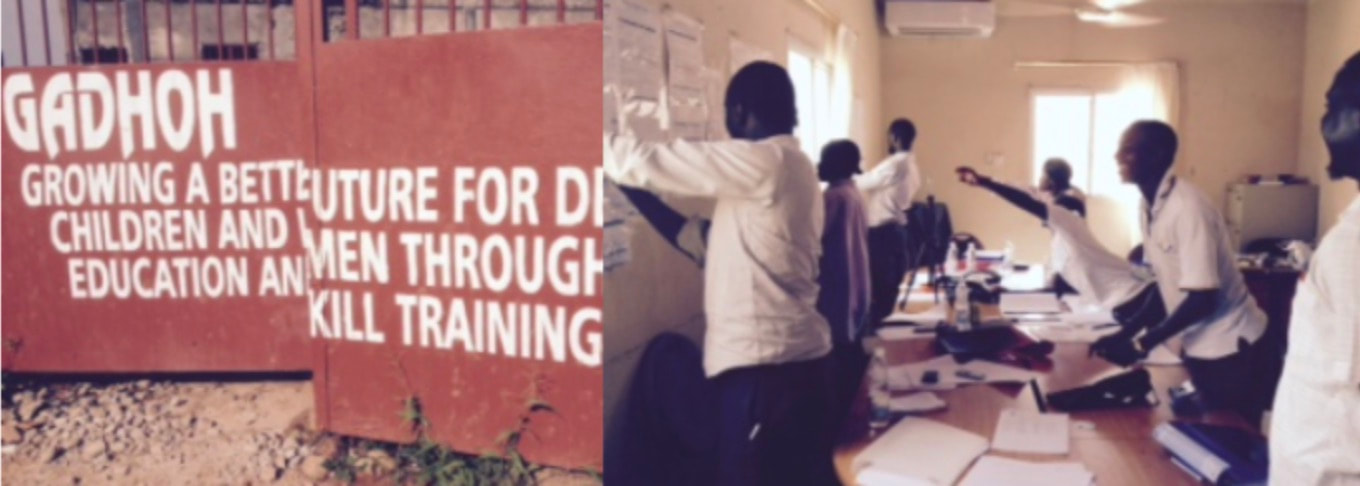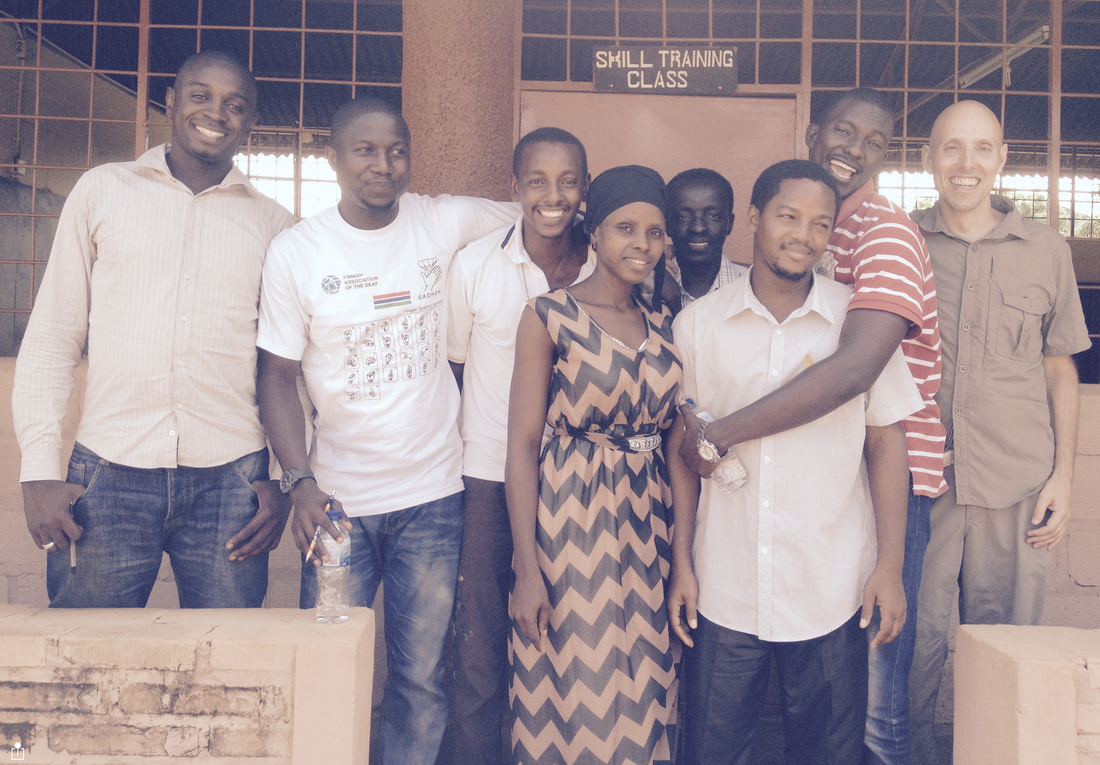Our focus
We focus on skills development and resources that are relevant and useful, with the potential to have a lasting impact on the lives of Deaf Gambians and GSL interpreters, individually and collectively. We work hard not to do things 'for' people involved in the project, instead supporting them to develop the skills to do what needs to be done for themselves. Currently our focus is on developing skills and the habit of using SMART goals, to improve planning and accountability.
Main project activities
1) Support Deaf GSL teachers to provide GSL classes for hearing people. We pay the teachers a travel allowance, have provided training and resources (with Gary Quinn from Heriot Watt university), and encourage ongoing teacher development.
The GSL classes provide the opportunity to identify hearing Gambians with the interest and potential to become GSL interpreters. This project can explore how best to support them in their development.
2) Pay Deaf English teachers to provide English literacy classes for Deaf GSL teachers.
3) Pay the salary of Lamin Sonko, to lead the professional development of interpreters in the Gambia, provide community interpreting, and provide interpreting support for GADHOH (The Gambia Association of Deaf and Hard of Hearing people).
4) Provide remote 1:1 Continuing Professional Development for Lamin Sonko, both for his own professional development, and to support him with his work with developing interpreters.
5) Pay a freelance 'top up' to two developing interpreters, for any community interpreting work they do that isn't otherwise paid.
The GSL classes provide the opportunity to identify hearing Gambians with the interest and potential to become GSL interpreters. This project can explore how best to support them in their development.
2) Pay Deaf English teachers to provide English literacy classes for Deaf GSL teachers.
3) Pay the salary of Lamin Sonko, to lead the professional development of interpreters in the Gambia, provide community interpreting, and provide interpreting support for GADHOH (The Gambia Association of Deaf and Hard of Hearing people).
4) Provide remote 1:1 Continuing Professional Development for Lamin Sonko, both for his own professional development, and to support him with his work with developing interpreters.
5) Pay a freelance 'top up' to two developing interpreters, for any community interpreting work they do that isn't otherwise paid.
Some of what we have achieved so far
In 2015 we provided three weeks of Interpreter Development Training at GADHOH, involving Deaf GSL users in training and role plays, and developed plain English interpreter learning resources in an electronic format, to prevent loss and damage (as had happened with previous project resources).
Supported the recording of naturalistic Gambian Sign Language (GSL) for the interpreters and GSL teachers to use in their development.
Worked with them to establish of the Association of Sign language Interpreters – Gambia (ASLI-G), their own professional body to recognise and promote the profession, ethics, and standards.
In 2017 sent three of the interpreters to the first AFSLI conference.
In 2018, with Gary Quinn, provided training for and created resources with Deaf GSL teachers and GSL interpreters covering linguistics, Sign Language linguistics, and Sign Language teaching methodology.
There's a longer list of frustrations, failures and painful learning. But it's through these that the successes are achieved.
Supported the recording of naturalistic Gambian Sign Language (GSL) for the interpreters and GSL teachers to use in their development.
Worked with them to establish of the Association of Sign language Interpreters – Gambia (ASLI-G), their own professional body to recognise and promote the profession, ethics, and standards.
In 2017 sent three of the interpreters to the first AFSLI conference.
In 2018, with Gary Quinn, provided training for and created resources with Deaf GSL teachers and GSL interpreters covering linguistics, Sign Language linguistics, and Sign Language teaching methodology.
There's a longer list of frustrations, failures and painful learning. But it's through these that the successes are achieved.
Fundraising and project administration
A group of us contributed £5, £10, or £15 a month each, for five years. This, plus some larger donations, has allowed us to build up a small reserve in order to sustain the project for the next few years.
All the administration and training is done on a completely voluntary basis, and so all your donations (except for the cost of transferring the money to The Gambia) go directly to the project.
Being a small project, we make sure every penny is well spent.
All the administration and training is done on a completely voluntary basis, and so all your donations (except for the cost of transferring the money to The Gambia) go directly to the project.
Being a small project, we make sure every penny is well spent.
The Gambia, and how this projected started
Gambia is a country in West Africa, the smallest country in mainland Africa, with a population of 1.85 million. It is effectively a strip of land 15 to 30 miles wide and 295 miles long on either bank of the Gambia River, surrounded on three sides by Senegal.
The lingua franca is English, with Wolof and Mandinka major tribal languages. Its main income is from peanut exports, fishing, and tourism, it is heavily dependent on foreign aid, and about a third of the population lives below the international poverty line of US$1.25 a day. There is almost no government support for Deaf people or interpreters.
Many Deaf people there use Gambia Sign Language (GSL) which is a developing indigenous sign language.
This project started when a Gambian Sign Language interpreter, Yahya Jabbi, came to the Association of Sign Language Interpreters (ASLI) conference in September 2012 to ask for support with interpreters' salaries, as a major donor had just pulled out.
£1,000 was raised on the night. But recognising the need to provide dependable support for them in providing and growing a sustainable service over the longer term I started this project, with the support of an 'expert panel' of people with relevant experience we could draw on.
The project combines financial support (salaries) with practical support (e.g. providing interpreter training, lap tops, and video cameras), and involvement with strategy, working with them to develop strategies to grow, professionalise and sustain the service.
Many Deaf people there use Gambia Sign Language (GSL) which is a developing indigenous sign language.
This project started when a Gambian Sign Language interpreter, Yahya Jabbi, came to the Association of Sign Language Interpreters (ASLI) conference in September 2012 to ask for support with interpreters' salaries, as a major donor had just pulled out.
£1,000 was raised on the night. But recognising the need to provide dependable support for them in providing and growing a sustainable service over the longer term I started this project, with the support of an 'expert panel' of people with relevant experience we could draw on.
The project combines financial support (salaries) with practical support (e.g. providing interpreter training, lap tops, and video cameras), and involvement with strategy, working with them to develop strategies to grow, professionalise and sustain the service.
Deaf Gambians
In 2015 we went to The Gambia and provided three weeks interpreter training. As part of that training we invited young Deaf people to came to talk to us about the need for interpreters in The Gambia. This was to provide feedback for the interpreters on what Deaf people thought was important, and also to be filmed to use as part of the interpreter training.
This video shows many of the young Deaf people getting ready for the group photo. To see more GSL, and read about their training, see the Interpreter Training Blog 2015.
This video shows many of the young Deaf people getting ready for the group photo. To see more GSL, and read about their training, see the Interpreter Training Blog 2015.
Students on the interpreter training course, 2015
Back row, from left to right: Yahya Jabbi (previously the Senior Interpreter for GADHOH), Amadou Bah (nurse and disability rights campaigner), Yahya Sanneh (an ex interpreter), Amadou Bah (a nurse), Lamin Sonko (one of our project funded interpreters), Darren Townsend-Handscomb (UK interpreter providing training).
Front row: Mansata Dampha (we previously funded her as an interpreter, she is now employed by a deaf school), and Bakary Sanneh (employed by GTTI college to work with Deaf students).
Front row: Mansata Dampha (we previously funded her as an interpreter, she is now employed by a deaf school), and Bakary Sanneh (employed by GTTI college to work with Deaf students).


